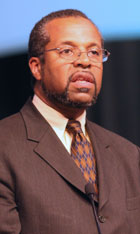The United Methodist Church will continue to "sit at the table" and retain its 35-year membership with the Religious Coalition for Reproductive Choice.
In a May 2 vote of 416-384, the 2008 General Conference affirmed continued membership of the denomination's Board of Church and Society and the Women's Division of the Board of Global Ministries in the organization.

The Rev. Tracy Malone
"It is important to stay at the interfaith table so our Social Principles can inform other denominations," said the Rev. Tracy Smith Malone, a delegate from Northern Illinois and member of the Board of Church and Society.
Fourteen denominations including the Episcopal Church, Presbyterian Church (USA), United Church of Christ, Unitarian Universalism, Conservative Judaism and others are also full members of the Religious Coalition for Reproductive Choice.
"RCRC does in fact support and advocate for all types of abortion," said Marget H. Sikes, vice chair of the committee bringing the legislation to the conference and a board of director's member of Church and Society. "The fact that they advocate for all types of abortions is troubling if not offensive."
Other delegates argued that the coalition does not support all forms of abortion. "Those claims are not accurate," said Fredrick Brewington, chair of the committee and also a member of the Board of Church and Society.
"Because we are at the table, we are able to make a difference for people who are in real need," he said.
Abortion

Marget H. Sikes
In other action, the 2008 United Methodist General Conference adopted a statement on abortion that adds language offering "ministries to reduce unintended pregnancies" and to assist the ministry of crisis pregnancy and support centers that help women "find feasible alternatives to abortion."
The Social Principles of The United Methodist Church first dealt with abortion in 1972. The church does not approve of abortion but "respects the sacredness of the life and well-being of the mother and the unborn child."
Found in the Book of Discipline, the Social Principles are a "prayerful and thoughtful effort on the part of the General Conference to speak to the human issues in the contemporary world from a sound biblical and theological foundation as historically demonstrated in United Methodist traditions." The General Conference amended the 1972 statement on abortion in 1976, 1980, 1984, 1988, 1992, 1996 and 2000.
Stem-cell research
The 2008 conference passed a new resolution on stem-cell research calling for the denomination's Board of Church and Society to identify and publish on its Web site educational resources on stem-cell research.

Frederick Brewington
"We encourage each pastor to use the resources to become informed concerning the debate regarding the use of embryonic stem cells for medical research and to offer these resources for study in her or his local church," the resolution said.
Saying "some believe this century will be the 'Century of Biology,'" the 2008 General Conference voted to join with other faith communities to support and dialogue with the medical and scientific communities concerning the ethic standards for its use.
*Gilbert is a news writer for United Methodist News Service.
News media contact: Kathy Gilbert, Nashville, Tenn., (615) 742-5470 or [email protected].
Related Articles
Abortion opponents speak out during national rally
Resources
Like what you're reading? Support the ministry of UM News! Your support ensures the latest denominational news, dynamic stories and informative articles will continue to connect our global community. Make a tax-deductible donation at ResourceUMC.org/GiveUMCom.




